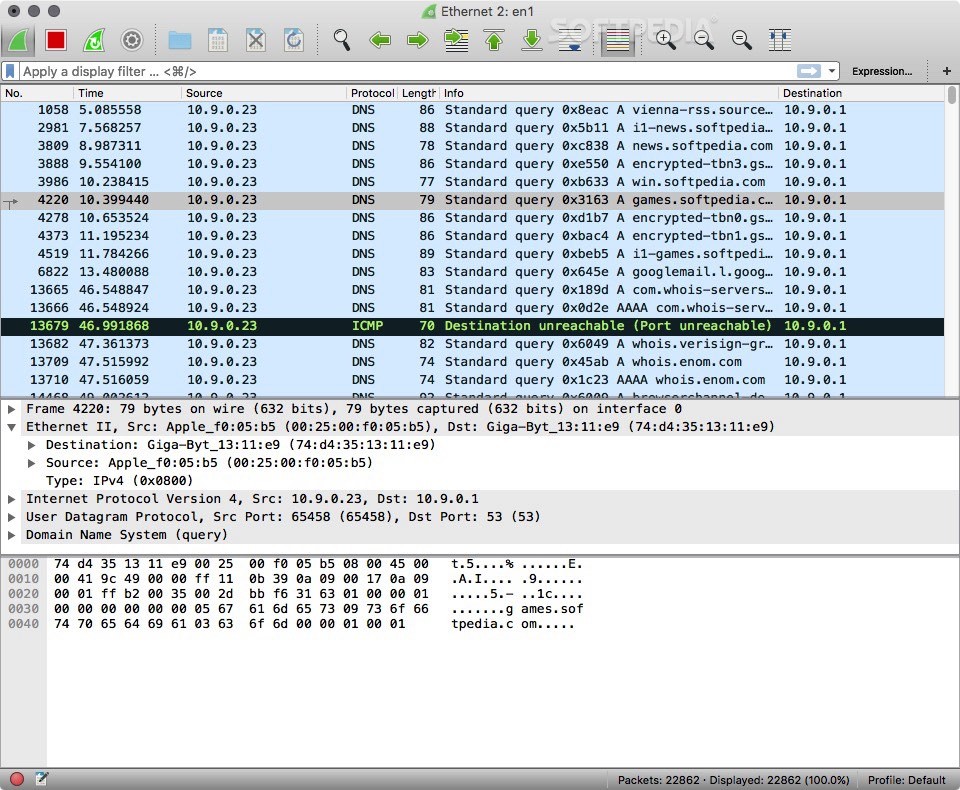Wireshark is the world’s foremost and widely-used network protocol analyzer. It lets you see what’s happening on your network at a microscopic level and is the de facto (and often de jure) standard across many commercial and non-profit enterprises, government agencies, and educational institutions. Wireshark can read packets from a number of different file types. See the Wireshark man page or the Wireshark User's Guide for a list of supported file formats. Wireshark can transparently read compressed versions of any of those files if the required compression library was available when Wireshark. Download Wireshark for Windows & read reviews. A free tool to monitor and analyze network traffic. You can also map the traffic, address, and MAC of each host on.
For each of the MAC addresses (001d.e50a.d740, 0800.2774.b2c5, e4be.ede3.f013), the switch sends out 4 frames using the particular MAC address as a source, and the 0100.0ccd.cdcd as a destination, with each frame using a different type: SNAP (OUI 0x00000c, PID 0x0115), AppleTalk (EtherType 0x809b), IPX (EtherType 0x8137), and ARP (EtherType.
Table of Contents
Quicklinks: Wireshark: Installation Chapter
Install Wireshark with a Package Manager
Where available, prefer your package manager. Note that Wireshark v3 is not currently available on many Linux package managers (this will change soon).
| System | Install Command | Latest Version |
|---|---|---|
| Linux | $PkgManager install wireshark | 2.6.8 and below |
| Macos | brew install --cask wireshark | 3.0.2 |
| Windows | choco install wireshark | 3.0.2 |
Installing tshark Only
Note: If you have not used tshark before, you should install the wiresharkpackage as above before limiting yourself to the CLI.
If you want to install just tshark and no Qt/GUI components, this is possible onvarious linux distributions. The package is called tshark or wireshark-clidepending on the platform.
Install the package tshark:

- Alpine >= 3.9
- Debian >= 9
- FreeBSD >= 11
- OpenMandriva >= 3.0
- PCLinuxOS
- Ubuntu >= 14.04
Install the package wireshark-cli.
- Arch Linux
- CentOS >= 8
- Fedora >= 30
- RedHat
For up-to-date package information, check the package registry fortshark andwireshark-cli
Install with a package
To get the most up-to-date official packages, visit Wireshark’s Download Page.
There are multiple packages available from Wireshark’s download page. The installation is simple, but make sure to check the components that.
Install from Source
Linux currently does not have packages in official repositories, so if you want the latest, you have to build it (this will likely change soon).
Linux, v3.0.0
You need to install from source to get v3 on Linux. This will get a clean system on Ubuntu18.04 to an install:
If you are on a different system, only the last 3 steps apply. Make sure thatyou’ve satisfied the other dependencies. cmake will kindly let you know if youhaven’t.
Check Installation
1. Check Version
If the version doesn’t match the expected one, you may want toinstall from source or use Wireshark’s download page.
2. Check Interfaces
tshark -D will list all interfaces that it sees.
dumpcap does not see and cannot capture on virtual interfaces. This means that dumpcap -D will show fewer interfaces than tshark -D.
Different systems will report different interfaces. tshark will treat the first interface as the default interface and capture from it by default.In other words, tshark aliases to tshark -i 1. You may need to use sudo depending on your installation.Default interfaces on installs of macos, windows, linux, and freebsd are shown below.
3. Test Live Capture
Entering the tshark command should immediately start capturing packets on the default interface. If you donot see packets, check out Choosing an Interface.
4. Make Sure Utilities are on $PATH
Download Wireshark For Mac
Setting up your environment should be done once and done well. There are a coupleAdditional work is usually necessary to make sure all utilities are on the path.
bash
You can verify whether all are installed with the following:
If a util is installed but not on your $PATH, you can use find / -name $util 2>/dev/nullto find out where it may be. For example, on Linux for 3.0.0, extcap tools areat /usr/lib/x86_64-linux-gnu/wireshark/extcap. To add them to your path, useecho 'export PATH=$PATH:$folder' >> ~/.profile.
Powershell on Windows
Currently, extcap utils need to bemoved from Wiresharkextcap => Wiresharkto be useable. If you have not added your %Program Files% to your $PATH, you cando that with an Admin user:
[Environment]::SetEnvironmentVariable('PATH', '$PATH;$ENV:ProgramFilesWireshark', 'Machine')
You will need to reopen Powershell for the $PATH to be updated.
Download Wireshark For Mac

Wireshark
Wireshark is a network packet analyzer. A network packet analyzer will try to capture network packets and tries to display that packet data as detailed as possible.
You could think of a network packet analyzer as a measuring device used to examine what’s going on inside a network cable.
In the past, such tools were either very expensive, proprietary, or both. However, with the advent of Wireshark, all that has changed.
Wireshark is perhaps one of the best open source packet analyzers available today.
Download Wireshark For Windows 10
Wireshark provides:
- Available for UNIX and Windows.
- Capture live packet data from a network interface.
- Open files containing packet data captured with tcpdump/WinDump, Wireshark, and a number of other packet capture programs.
- Import packets from text files containing hex dumps of packet data.
- Display packets with very detailed protocol information.
- Save packet data captured.
- Export some or all packets in a number of capture file formats.
- Filter packets on many criteria.